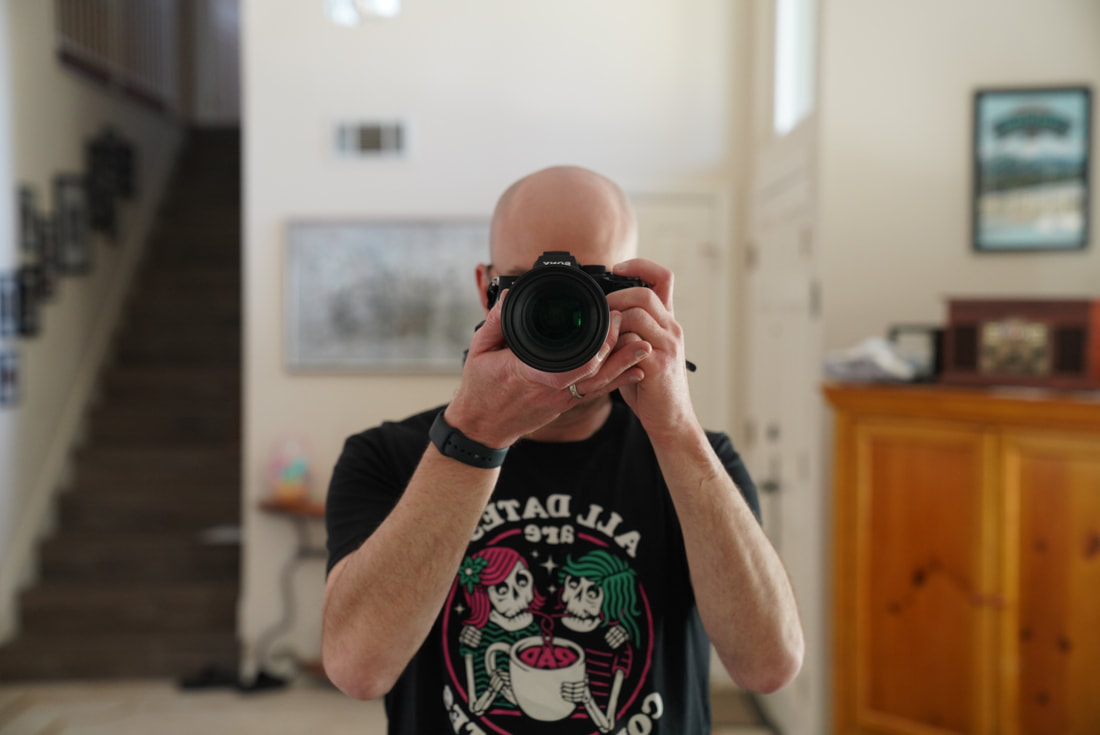Every Snap of the Shutter10/21/2022 As someone who grew up without a lot of financial resources, I could never afford to buy a camera. So, when my more financially secure friends would show off their flashy devices, I was always a little jealous and envious. Up until I got an iPhone in 2009, I was relegated to cheapie disposable cameras that would only handle one roll of film. You know the kind: 27 photos with no depth of field and a teeny-tiny viewfinder. It was pretty pathetic.
The iPhone changed all of that for me. When I bought my first Apple smartphone almost a decade and a half ago, I suddenly had an unlimited number of photographs with a variety of editing tools at my disposal. No more one-time-use camera for me! Suddenly, I could take pictures of anything anywhere at any time. After a lifetime without anything vaguely resembling a real camera, this was a revelation. Over the ensuing years, I took thousands of photos: my family, pets, concerts, vacations, collectibles... I thoroughly enjoyed photographing my mild-mannered life for posterity's sake. When social media hit big (first with Friendster, then MySpace, then Facebook), I suddenly had an audience - albeit a small one - for my photography adventures. I held out on joining Facebook until 2010, and I didn't take the plunge into Instagram until late 2011. For the first few years, I pretty much ignored my Instagram account, only posting pictures intermittently for photo contests and a handful of memorable moments. In 2015, however, after I taught a few AP English lessons on photography, visual rhetoric, and tone, I started posting more actively and consistently on Instagram. In the last seven years, I've gone from 14 posts to almost 700 on my personal account (@farfromkansas); I also opened up a few other Instagram accounts for my various creative and professional projects (@buenalibrary, @notsosilentlibrarian, and @briarroseramblers, etc.). During that time, I began to experiment more with filters, camera angles, portrait mode, depth of field, and a variety of other simple techniques. About half a year ago, I finally took the plunge and bought a REAL camera: a Sony Alpha a7R IV Mirrorless Digital Camera w/Sony FE 24-70mm f/2.8 GM Lens. It cost a pretty penny (significantly more than anything else I've purchased in my entire life), but I was lucky enough to receive some inheritance money after my father passed away. Basically, it was a "feel better about your dead dad" vanity purchase. That being said, I have a feeling that Pops would have appreciated this use of his money. Since early 2022, I've been learning a lot - and I mean A LOT - about photography. Luckily for me, I had a few built-in advisors: Emmet Cullen, Amanda Graves, Eddie Raburn, and a few other friends/acquaintances. Using their guidance and expertise, I purchased a "forever" camera that should last me a lifetime. So, what have I learned this year, as I've started using a real camera? Here are a few tips:
0 Comments
Book Review: The Essex Serpent10/10/2022  The Essex Serpent by Sarah Perry The Essex Serpent by Sarah PerryMy rating: 4 of 5 stars Despite my eager hopes, Sarah Perry's The Essex Serpent is decidedly not a supernatural horror novel about a giant winged snake terrorizing the British countryside. Alas, Perry's book shares more serpentine DNA with Charles Dickens than Stephen King. Instead of a suspenseful supernatural story, The Essex Serpent is a slow-burning work of literary fiction that examines the muddy, complicated intersection of science and faith, friendship and love. If you enjoy Victorian literature, star-crossed lovers, and the subtleties of stuffy British settings, this might be more up your (cobblestone) alley. As she alternates between the Essex countryside and London cityscape, Perry provides a colorful cast of outcasts and misfits. However, the core of the novel revolves around Cora Seaborne: a young widow who finds herself liberated by the death of her older, controlling husband. Cora, a devout fan of science and nature, finds herself drawn to the sleepy seaside town of Aldwinter, where a minister and his family informally adopt Cora and her entourage. This vicar, Will Ransome, is an atypical pastor: while he clearly tends after his sheep (literally, in fact, during one scene), he also finds himself inexplicably drawn to the unpredictable Cora. Meanwhile, Will's ailing wife, Stella, seems intent on bringing her husband and Cora closer together. Along the way, Perry also includes a variety of subplots, including a doctor who pines after Cora, a rich man who pines after Cora's maidservant, and the maidservant who pines after social justice. Oh, what a tangled web (or murky serpent's nest?) we weave when we slither through the British marshland and dingy streets of London! Mixed metaphors aside, the fact remains: things get complicated. I have to admit, it took me a long time to get into The Essex Serpent. For the first 100+ pages, Perry's book wanders and winds through several seemingly unconnected storylines, leaving the reader without much of a solid thread to follow. Where is this book going? I repeatedly wondered to myself. Like a child lost in the foggy marsh of the British coastline, many readers will undoubtedly meander through chapter after chapter of passable prose until stumbling upon a profound passage or plot point. Perry is strongest when she subverts expectations - which she does frequently throughout the novel. What you expect to happen from the cliched conventions of Victorian literature rarely comes to fruition. Young lovers don't always stay in love, but old lovers do. The dying don't always die, but the healthy sometimes barely escape death. The wise act foolishly, and the foolish grow wiser through their lived experiences. It's unique enough to differentiate The Essex Serpent from many of its lesser peers. However, while I admire Perry's attempt to break free from tried-and-true tropes, it's not enough for me to overlook the frequently dull pacing of the book. While I can't say that I enjoyed reading The Essex Serpent, the novel is clearly a complex, well-crafted study of the British experience in Victorian England. Will I ever read this novel again? The answer is a resounding no. Will I recommend it to others? Only if they enjoy tea, crumpets, and novels that flicker through the night like candles in a dusty window. View all my reviews AuthorMild-mannered librarian by day… and a mild-mannered rock & roller by night. Archives
August 2023
Categories |


 RSS Feed
RSS Feed
